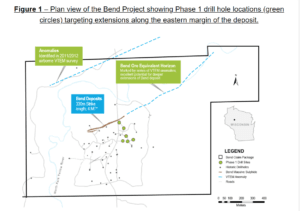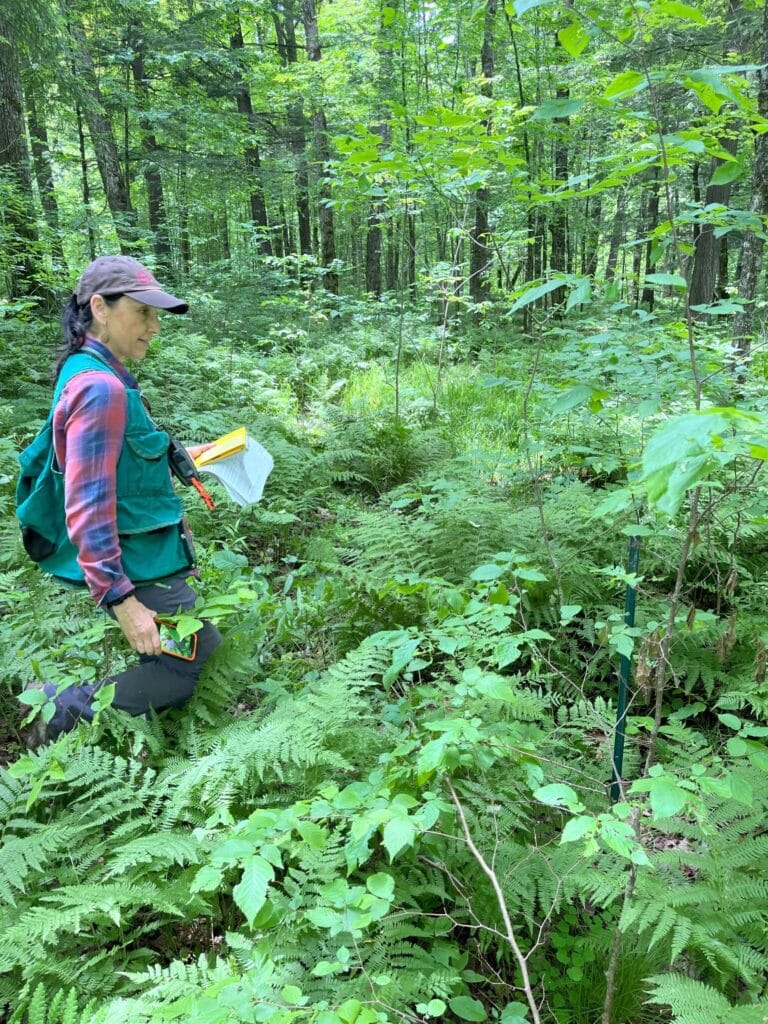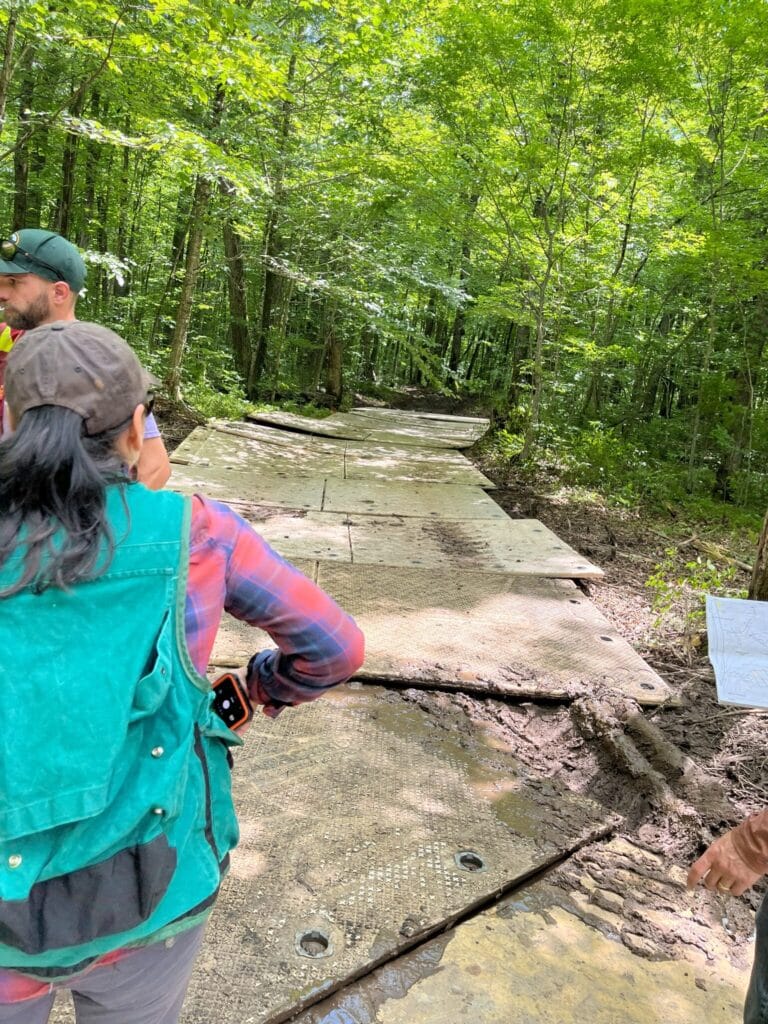Company explores for copper and gold in national forest in northern Wisconsin
Wisconsin's Green Fire, June 26, 2025

Kidrick Swamp, Wisconsin State Natural Area #464, Chequamegon-Nicolet National Forest, Taylor County, photo from Joshua Mayer via Flickr. This SNA is located in an area of the national forest northwest from the Bend deposit and drilling sites, and illustrates some of the forest and wetlands in the area.
Company explores for copper and gold in national forest in northern Wisconsin
by Don Behm, WGF Board Member
A contractor for Green Light Wisconsin LLC was to begin exploratory drilling in late June 2025 into a known deposit of copper-bearing sulfide ore within the Chequamegon National Forest in Taylor County. Wisconsin’s Green Fire works with the Sierra Club and the River Alliance of Wisconsin to monitor metallic mineral exploration and mining proposals across northern Wisconsin.
The contractor, Minnesota-based Taconite Drilling LLC, plans to drill up to 8 holes at six locations on the site during the next 5 weeks, GreenLight Metals said in a June 12 news release (see Figure 1 below). Green Light Wisconsin (GLW) is a subsidiary of GreenLight Metals.

Image from GLW’s June 12, 2025 news release depicting “phase 1 drill hole locations” in the Bend Project. Click to open a larger view of the figure.
The ore deposit
The Bend copper-gold deposit encompasses 519 acres in the Town of Westboro near the North Branch Yellow River, around 19 miles northwest of Medford. Water will be pumped from the river for use in drilling.
At this time, the Bend deposit is estimated to contain 4.3 million tons of copper-bearing ore with some gold and silver, according to the Wisconsin Department of Natural Resources (WDNR). The estimate is based on exploration drilling done in the early 1990s by a company known as the Jump River Joint Venture.
Drilling will be done on a 40-acre parcel along the eastern margin of the deposit to confirm its mineral content and potential value, the company said. GLW also has proposed drilling an additional 15 holes into the Bend deposit on either side of the 40-acre parcel this year and that request is under review by the U.S. Forest Service.
The Bend deposit is on land ceded by native Ojibwe tribal nations to the United States government under the treaties of 1837 and 1842. Under those treaties, the Ojibwe Tribes in Wisconsin retained the legal right, known as usufruct, to hunt, fish, and gather wild plants on public lands within the ceded territories.
Ongoing regulatory process
Aquila Resources Inc. completed additional exploration drilling in 2011 and 2012. Green Light Wisconsin (GLW) bought Aquila Resources in July 2021. In April 2023, GLW submitted to the WDNR a complete notice of intent to conduct exploration drilling at the Bend deposit.
In May 2023, the WDNR gave conditional approval to the company’s metallic mineral exploration proposal for the first 8 holes there. The U.S. Forest Service subsequently issued the company a “notice to proceed” with exploration drilling in February 2025.
Then in March 2025, the Lac du Flambeau Band of Lake Superior Chippewa filed a lawsuit in Taylor County Circuit Court asking for a judge to rule if the WDNR’s approval for exploration violated state law. The agency did not require Green Light to obtain an industrial facility stormwater discharge permit for the drilling activity, according to the lawsuit. The legal action was based on the Lac du Flambeau Band’s treaty rights.
Such a permit would have provided local wild rice beds, as well as nearby tribal cultural and historic places, with greater environmental protections during drilling than the construction site general permit given by the WDNR, the lawsuit said.
In early June, Taylor County Judge Ann Knox-Bauer ruled that the Tribe did not show those resources and sites could not be adequately protected by conditions imposed under the general stormwater discharge permit granted to the company, according to a report by Wisconsin Public Radio.
Lac du Flambeau and other Ojibwe nations in Wisconsin are members of the Great Lakes Indian Fish and Wildlife Commission (GLIFWC).
The U.S. Forest Service (USFS) shares in the federal government’s trust responsibility and treaty obligations to work with the Tribes on a government-to-government basis to protect the Tribes’ rights on ceded lands now administered by the forest service. GLIFWC staff are coordinating with forest service staff to monitor impacts to treaty resources and ensure exploration activities on the land adhere to the plan of operations approved by the USFS, GLIFWC said in a statement.
Regarding the proposed drilling of 15 additional holes into the Bend deposit later this year, GLIFWC is concerned that the forest service has announced it will expedite its review of the activity and exclude it from a more rigorous environmental review. GLIFWC staff is “continuing to review the proposal for significant environmental effects,” particularly impacts to rare plants and sensitive species, impacts to floodplains and wetlands, and impacts to cultural sites, according to the statement provided by a representative of GLIFWC.
- GLIFWC staff tour Bend deposit drilling site in June 2025. Photo courtesy of James Rasmussen, GLIFWC Policy Analyst.
- GLIFWC staff tour Bend deposit drilling site in June 2025. Mats cover portions of the forest floor on path for drilling equipment. Photo courtesy of James Rasmussen, GLIFWC Policy Analyst.
Alongside our partners, Wisconsin’s Green Fire plans to continue monitoring this mineral exploration, particularly because of our focus on protecting clean water, rich biodiversity, and healthy communities in Wisconsin and beyond.


